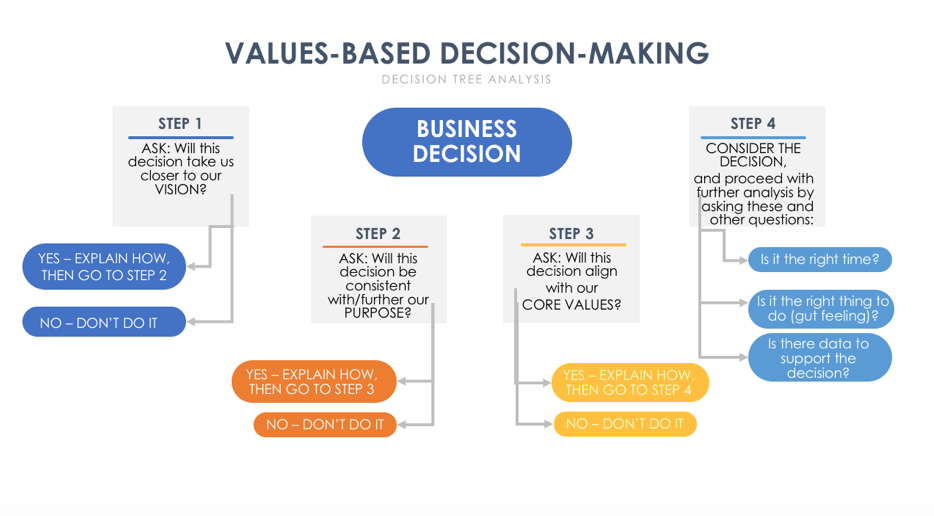Core values keep your business between the mayo and the mustard
Core values keep your business between the mayo and the mustard

At a wedding several years ago I heard a best man offer the following advice to the groom: Keep it between the mayo and the mustard. I had no idea what this meant, so I asked around. Eventually someone offered that it means that when you’re driving, keep your car between the lines on the road—the yellow line in the middle being the mustard and the white line on the side being the mayo. I thought it odd advice, particularly in a wedding speech, but reflecting on it now I think it’s an excellent analogy for the role that core values play in your business. Core values help you keep your business between the mayo and the mustard.
Core values are the guideposts of your business. They are the non-negotiable manner in which your business does business; in which your business will go about pursuing its mission and vision.
Core values are what your business stands for and, perhaps more important, what it doesn’t or won’t stand for. They help you stay within the lines.
And as I covered in a prior article, core values make running your business so much easier and save you so much energy because of values-based decision-making.
So what are the core values of your business? How do you go about deciding what they are?
There is no one-size-fits-all approach to these questions. Each business will have different core values, and each will arrive at them differently.
One issue that comes up in the core values discussion is who should be included in the process of deciding what they are. The business owner(s)? The leadership team? Senior management? All team members?
I think a good rule of thumb is that the more people you can get involved in the process, the more people who are given the opportunity to provide their input, the more sticky the core values will be once they are set. They will be seen less as a decree from above and more as a consensus. This is important because core values that aren’t shared by the vast majority of people in your business aren’t really core values of the business.
At a business I worked with recently, all team members were surveyed as to what they felt the core values of the business were, and that information was used by the ownership team to create the core values. Ultimately, the core values must be approved by ownership, but getting input on them by team members at all levels of the business is generally a good idea.
At the end of the day, your business should have 3-5 well-defined core values. More than five is acceptable, but the more you have the more diluted each becomes, and that can lead to a lack of focus and commitment on each value. Keeping it to a max of five forces you to make some decisions on what’s most important. It also makes values-based decision-making easier.
Whatever process you use to decide on the core values of your business, at the end of the day, for each core value you decide on, you should:
- Describe it in one word (or 2-3 words if it’s a concept, like customer service)
- Express it in a sentence (gives context)
- Provide an example of how you do it now (proof of concept)
- Provide an example of how you will continue to do it in future (proof of concept)
For example, if one of your business’ core values is customer service, you might express it this way:
Core value: Customer Service.
Context: The customer is always right.
Proof of concept: We have 24-hour customer support.
Proof of concept: We provide bonuses to team members based on customer satisfaction surveys.
Here’s another example:
Core value: Innovation.
Context: We are always on the cutting edge of new technology.
Proof of concept: We have won two “Best New Product” awards.
Proof of concept: We have an industry-leading R&D budget as percentage of revenues.
Some businesses express their core values publicly (on their website, in marketing materials) either as single words, or as sentences. Some do both. Do whatever feels right for your business.
But don’t skip the proof of concept part of the process. If you can’t come up with at least two concrete ways in which your business exhibits the core value, then it isn’t a core value.
Once the core values are set, make sure you run every decision you make in your business through the lens of is this consistent with our core values? If you don’t you risk confusing your people and creating a damaging misalignment in your business.
Your core values should be a source of pride for you and everyone in your business. Make sure you use them to keep your business between the mayo and the mustard.



